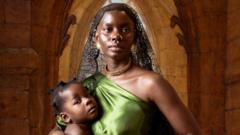Dola Posh embodies multifaceted identities: a photographer, a Nigerian, a mother, and a Briton. However, her sense of self became clouded after giving birth during the challenging circumstances of a COVID lockdown. Six days postpartum, Dola found herself alone in an English hospital, grappling with feelings of displacement and uncertainty about her future in photography.
Despite eager inquiries from loved ones back home in Lagos, Nigeria, her isolation deepened feelings of inadequacy. "I thought: ‘I’m me; the baby’s out, I’m still me.’ But no, I wasn’t me any more," she reflected on her struggles with postnatal depression—an experience that disproportionately impacts black women.
Upon her return from the hospital, Dola faced a flood of unsolicited parenting advice, which only intensified her feelings of confusion and helplessness. Exhausted from sleepless nights and overwhelmed by the monotony of her new life, she battled dark thoughts, questioning her ability to be a good mother. During this period of emotional turbulence, a crucial call to her health visitor provided the support she desperately needed.
Through therapy, Dola began to embrace photography as a means to express her emotions. Setting up her camera to take self-portraits with her daughter Monioluwa allowed her to articulate her struggles and triumphs visually. Drawing inspiration from traditional art forms, Dola unknowingly echoed a deep-seated connection to her upbringing in a religious household marked by images of motherhood and divinity.
As she composed her portraits, the act of donning a veil became symbolic of her reconnection to her heritage and identity. Sharing her truths about postnatal depression served as an empowering revelation, dismantling the stigma that surrounds maternal mental health crises.
Recognizing the urgency of discussing these issues, Dola aims to create a world where black mothers feel supported rather than burdened. With an award from camera manufacturer Leica to further her work, she strives to uplift narratives that celebrate the complexities of motherhood and challenge societal expectations.
"I want a world where black mothers don’t have to carry so much burden and feel like they have to go through that journey alone," Dola asserts, echoing a call for visibility and understanding in the media. Her journey embodies hope, as she embraces her identity, paving the way for others to share their stories and find strength in vulnerability.




















